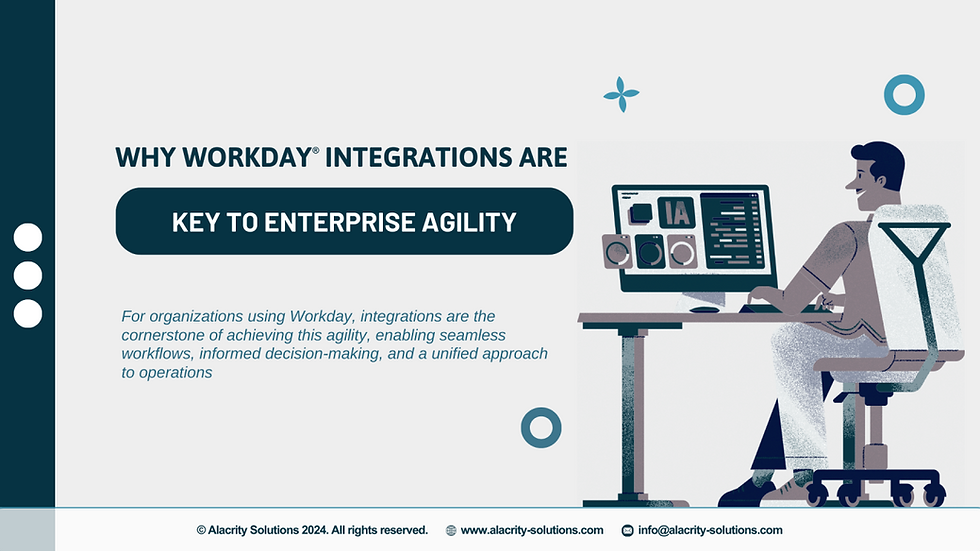Why Workday Integrations Are Key to Enterprise Agility
- Bumbble Beast
- Jan 28, 2025
- 3 min read

Enterprise agility is no longer a competitive advantage—it’s a necessity. The ability to adapt quickly to changing market demands, regulatory requirements, and workforce dynamics is critical to staying ahead. For organizations using Workday, integrations are the cornerstone of achieving this agility, enabling seamless workflows, informed decision-making, and a unified approach to operations.
Understanding Workday Integrations
Workday is a powerful cloud-based platform offering enterprise solutions for Human Capital Management (HCM), financial management, payroll, and more. However, no system exists in isolation. Businesses often rely on multiple applications for customer relationship management (CRM), payroll, time tracking, benefits management, and data analytics. Workday integrations ensure these systems communicate effectively, creating a cohesive ecosystem that drives efficiency and agility.
There are two types of Workday integrations:
Pre-Built Integrations: These are out-of-the-box solutions that Workday offers for commonly used third-party applications, such as ADP, Salesforce, and Microsoft Dynamics.
Custom Integrations: These are tailored solutions developed to meet specific business needs, leveraging Workday’s tools like Enterprise Interface Builder (EIB), Workday Studio, and APIs.
Why Workday Integrations Matter
Streamlined Processes Integrations eliminate manual data entry and redundancies by automating workflows. For instance, integrating Workday with a payroll system ensures that employee data updates in real time, reducing errors and saving valuable administrative hours.
Real-Time Data Flow Agile enterprises thrive on data-driven decisions. Workday integrations enable real-time data flow between systems, providing leaders with up-to-date insights into workforce performance, financial health, and operational metrics.
Enhanced Employee Experience Integrating Workday with systems like Slack or Microsoft Teams allows employees to access information or complete tasks without leaving their primary workspace. This boosts productivity and engagement by reducing friction in day-to-day operations.
Scalability and Flexibility As businesses grow and evolve, so do their system requirements. Workday integrations allow companies to scale by incorporating new tools and processes without disrupting existing workflows. This flexibility ensures businesses remain agile and responsive to change.
Compliance and Risk Management Integrating Workday with compliance systems ensures organizations meet regulatory requirements. For example, integrations with tools for tax reporting or industry-specific compliance help mitigate risks and maintain audit readiness.
Cost Optimization By automating processes and ensuring data consistency, Workday integrations reduce operational inefficiencies and errors. This translates to significant cost savings over time, especially in areas like payroll, benefits administration, and workforce planning.
Real-World Use Cases
HR and Payroll Integration: A multinational corporation integrated Workday with ADP to streamline payroll processing across regions. This reduced payroll cycle times by 30% and eliminated compliance issues caused by data discrepancies.
CRM Integration: By connecting Workday with Salesforce, a tech company enabled seamless data sharing between HR and sales teams, improving collaboration and workforce planning.
Analytics Integration: A retail business integrated Workday with Tableau to generate real-time dashboards combining financial, workforce, and sales data. This empowered executives with actionable insights to drive growth strategies.
Keys to Successful Workday Integrations
Clear Objectives: Define the purpose of the integration and desired outcomes.
Strong Governance: Establish roles and responsibilities for managing integrations.
Choose the Right Tools: Decide whether pre-built or custom integrations are more suitable for your needs.
Test Thoroughly: Conduct rigorous testing to ensure integrations work as intended before going live.
Monitor Continuously: Regularly review and update integrations to align with changing business needs.
Conclusion
Workday integrations are not just a technical necessity—they are a strategic enabler of enterprise agility. By connecting Workday to your broader technology ecosystem, you empower your organization to respond faster, make better decisions, and operate more efficiently. Whether you’re scaling operations, optimizing costs, or enhancing the employee experience, the right integrations can be the driving force behind your success.
To remain competitive in today’s world, businesses must think beyond siloed systems and embrace the power of interconnectedness. Workday integrations provide the foundation for this connected future, helping enterprises unlock their full potential.






Comments